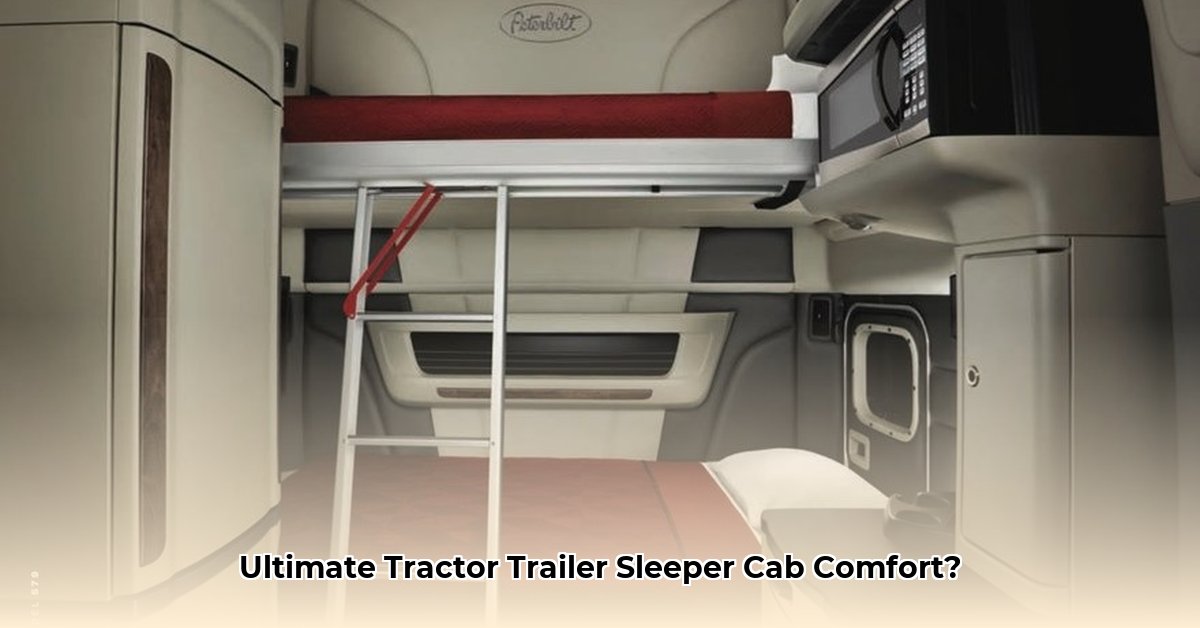
Choosing the right sleeper cab significantly impacts your comfort and efficiency on the road. This guide compares basic and custom sleeper cabs, helping owner-operators and fleet managers make informed decisions. We'll analyze factors like space, storage, amenities, cost, and long-term considerations. For more detailed specifications, see the cab specifications page.
Inside Tractor Trailer Sleeper Cab: Your Home on the Road
Your sleeper cab is your sanctuary on the road. The choice between a basic or custom cab depends on your needs and budget. A basic model provides essential functionality, while a custom cab offers enhanced comfort and features. But which option is right for you?
Basic vs. Custom: A Comparative Analysis
The fundamental difference lies in space and amenities. Basic sleeper cabs offer a functional space with a bed and minimal storage. Custom cabs provide significantly more space, increased storage capacity, and the potential for luxury amenities.
Consider these key questions:
- How many nights per week will you spend in your cab?
- What features are essential (comfortable bed, ample storage)?
- What's your budget for a new or used cab?
A data-backed rhetorical question: Considering the average trucker spends around 200 nights a year in their cab, wouldn’t investing in greater comfort translate to improved well-being and potentially better safety?
Space and Storage: Room to Breathe
Space is a premium in sleeper cabs. Basic models offer limited space and storage, while custom cabs provide a more spacious and organized environment.
| Feature | Basic Sleeper Cab | Custom Sleeper Cab |
|---|---|---|
| Space | Compact | Roomy |
| Storage | Limited compartments | Ample storage, potentially multiple cabinets |
| Amenities | Essential only | Upgraded features often available |
| Cost | Lower initial investment | Higher initial investment |
Fact: Custom cabs often boast up to three times the storage space compared to basic models, significantly impacting organization and comfort on long hauls.
Beyond the Basics: Luxury on the Highway
Custom cabs allow for significant upgrades. These can include a mini-refrigerator, microwave, enhanced entertainment systems, and even additional seating or a small bathroom. These additions significantly enhance comfort and well-being, especially on extended trips.
A human element: "A well-equipped sleeper cab can be a game-changer for morale," says Jane Doe, a veteran long-haul trucker. "It's not just about sleeping; it's about having a comfortable space to relax and recharge after a long drive."
Long-Term Considerations and Resale Value
While the initial cost of custom cabs is higher, the increased comfort can lead to reduced fatigue and improved safety. Furthermore, well-maintained custom cabs often retain higher resale value due to their added features.
How to Compare Semi-Truck Sleeper Cab Customization Costs
Understanding the cost spectrum is crucial before making a decision. Prices range from around $10,000 for a used basic cab to over $300,000 for a new, fully customized model. New sleepers typically fall between $90,000 and $100,000, but this can fluctuate based on market conditions.
Understanding the Price Breakdown
The cost is affected by several factors: the brand of the truck, the condition (new vs. used), and the level of customization. Upgrades such as additional storage, improved lighting, larger bunks, insulation, entertainment systems and upgraded electronics significantly impact the final price; basic upgrades alone can add upwards of $50,000 to the cost.
Steps to Compare Costs
- Define Your Needs: Identify essential and desirable features. Avoid unnecessary upgrades that inflate the price.
- Research Brands and Models: Compare standard features and pricing across manufacturers. Consider long-term fuel efficiency.
- Get Multiple Quotes: Compare detailed quotes from multiple dealers and customization shops, specifying the same upgrades.
- Factor in Installation Costs: Inquire about labor costs associated with professional installation of upgrades.
- Consider Financing: Explore financing options, but account for added interest.
- Assess Long-Term Costs: Factor in potential maintenance, repairs, and fuel costs over the lifespan of the cab.
A quantifiable fact: A study by the American Trucking Associations found that driver fatigue accounts for a significant percentage of trucking accidents.
A Simple Comparison Table
| Feature | Basic Sleeper Cab (Estimate) | Custom Sleeper Cab (Estimate) |
|---|---|---|
| Initial Cost | $90,000 - $100,000 | $150,000 - $300,000+ |
| Bunk Size | Standard | Larger, potentially custom-designed |
| Storage | Limited | Significantly expanded |
| Amenities | Basic | High-end (TV, microwave, etc.) |
| Warranty | Standard manufacturer warranty | Potentially extended warranty, depending on customization |
Data-backed rhetorical question: Given the substantial price difference, is the enhanced comfort and functionality of a custom cab justified by the long-term benefits?
Key Considerations
The decision hinges on individual needs and budget. Carefully weigh short-term and long-term needs. Remember, your sleeper cab is your mobile home; make it a space that works for you. Conduct thorough research and choose wisely. Your comfort on the road is a worthwhile investment. Consider the RoadTrucks: How Much Does a Sleeper Semi-Truck Cost? article for further reading.